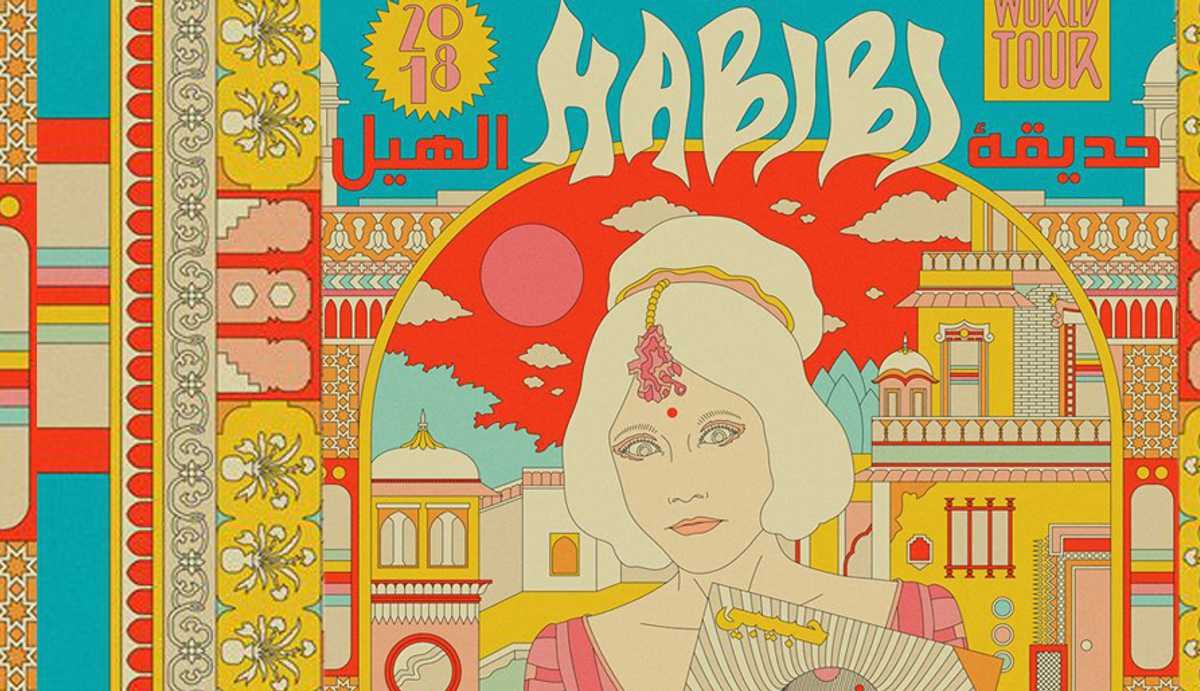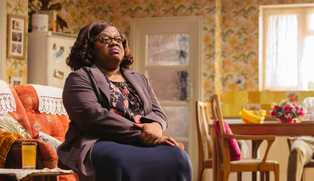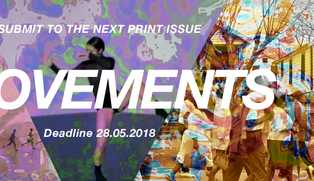Rahill Jamalifard is the Iranian-American lead singer of Habibi – a four-strong, Brooklyn-based band that blends garage rock, Middle Eastern melodies, and girl-group harmonies. Currently on a world tour, Rahill chats earthquakes, Shirazi poetry, and the internet with Courtney Yusuf from Skin Deep.
*
Courtney Yusuf: Where’s home for you right now? Rahill Jamalifard: For the past nine years I’ve been based in New York and right now I live in Ridgewood in Queens. It’s a diverse neighbourhood and there are a lot of families – South American, Polish, German – and a big Coptic Christian community. In the bodegas in the morning they’re listening to Fairouz or the Qu’ran, which always reminds me of home [Detroit] and that’s really, really nice. In summertime, there’s a great spot where you can play soccer with some of the local kids. They’re not proper matches but people can just show up and play – that’s one of my favourite things. CY: How important is the city to your work as a musician? RJ: I’m actually going upstate to record this weekend and I feel that more and more as I get older I really like upstate. It’s outside all of the chaos and you’re not affected by whatever’s going on around you. I don’t need the inspiration of the city when I’m recording – I want my thoughts only. I don’t want to be distracted by anything. CY: Is this urge to get out of the city something new? RJ: You know I don’t want to devalue how great it is to live in a place that’s always been progressive (at least in terms of the rest of America) and where diversity is so celebrated. But that being said, I’m still just kind of over the social appetite that everyone seems to have that really puts a lot of pressure on things. It’s always like ‘Oh, this is happening, and this is happening’ and there’s always a cool scene, and that’s becoming less and less appealing to me. Then I end up thinking: ‘What’s the point? Why do I even live here if I’m not really taking advantage of these things by going and being a part of it?’ I was watching this documentary on Arthur Russell and I was so inspired because he was part of a scene where if that scene didn’t exist, he wouldn’t have existed, and a lot of others too. I think when people look back at that, people always say ‘Well that was a different time, that was a different era or movement’ but that felt so much more real and authentic than anything I feel here within any scene or community. CY: Why do you think that’s the case? RJ: I think it’s the internet. We’re in this homogenized age with so much information, where it doesn’t matter where the fuck you are because you can connect with everybody all of the time. There’s a saturation of how many things are going on and that in itself creates competition. I just love the idea that – and I know I romanticise this sort of lifestyle – where I’m gonna make a point to go and see this thing without seeing who else is going (because I don’t give a fuck about that), where I wanna go because I care about this thing, and where I’m gonna take a chance because I want to see something new or find out something about myself. I just feel like that’s all gone now and it’s just a completely different social makeup that influences our person and us as individuals. We’re victims of the time that we’re in. And I know that everybody is a victim of the time that they’re in because there’s always something happening, but I guess this is just our problem. CY: So how do you build spaces and communities that push back against this? RJ: One thing that happened, that felt like something authentic, that wasn’t being done to feed the beast that we’ve created, was our recent record release for our EP. Instead of going down the ‘rock band’ route and asking my friends’ bands that are ‘trending’ right now to play, I wanted to be true to the things that I care about and love. So we had my friend’s free jazz weird thing and this Moroccan ensemble instead. I wanted to share things with people who would come to see us but would never go out of their way to see these other groups, and the whole night people were like ‘Oh wow this was so beautiful!’ And of course I felt like it was, but it wasn’t anything craazzzzy and I have no real reason to applaud myself. It was just doing something different. CY: So is it about putting things in front of people that defy what people feel like they have to put out in order to keep up? RJ: Right, exactly. I feel really lucky because I recognize that a lot of musicians and artists have to at first be accepted before they can practice any real form of 100% individuality, because first you need to get an audience. For me it was always like: ‘Is this a good idea? Is this too political? If this means something to me is it going to have any significance to the viewer?’ Now I’m in a position where people wanna know what I wanna do and I’m taking full advantage of that. Before I didn’t have that security. CY: You sing in Farsi on your latest EP and you’ve recently been attracting a lot of attention as an ‘Iranian-American’. Do you ever feel pressure to represent Iran? RJ: Oh yeah, it definitely happens and it’s definitely difficult because I don’t consider myself an aficionado of Iranian culture. I can speak fluently but I still get so embarrassed (my accent is terrible) and I don’t know what dynasty is what. Sometimes that’s terrifying. A big legendary Iranian artist came to my show and I was mortified, I was like: ‘You shouldn’t be here, this is not that special’. Of course I have this feeling of ‘Oh god, I don’t want to misrepresent my people’ but in my work I’m just really talking about what’s important to me and what’s influenced me in life so far. With this EP we did say overtly: ‘This is an Iranian thing’, a one-off solely dedicated to where I’m from, but throughout any artistic endeavour I’ve ever done, I more or less bleed that stuff. It’s in the fabric of my being and it always comes out creatively. I now see all these publications saying ‘Why now? Why are you trying to represent this now?’ and my answer to any of that is: ‘It’s not like I’m choosing to be Iranian now, I’ve always been Iranian and always embraced it, you’re just choosing to listen now!’ One review even said: ‘Well on the first record she sang about boys and now she’s singing about Iran’. I’m always gonna sing about boys because boys are always gonna influence my life. It’s not like I’ve matured and all that stuff – fuck no! It’s always going to be a mix of everything. CY: You’ve been doing some stuff with t-shirts recently. Would you mind talking a little bit about that? RJ: Sure! That all started when I was talking about how fucked up it was that there was no coverage of the earthquake that happened in Iran right around the time that things were happening in Puerto Rico and Mexico. I had been writing a bunch of posts about it and trying to work out which organizations you could donate to (because it’s really hard to donate to Iran directly through America because of the sanctions) and my two friends from the punk community were like: ‘we should do something about this’. So we started making these t-shirts and I brought one idea, to use this quote from Saadi [an Iranian poet] that’s on the UN building. The quote is incredible. It’s like ‘if one limb of humankind is suffering the entire body suffers’ and that’s just the truth. Saadi is from my father’s city of Shiraz and he has a huge significance in my life. My grandfather was illiterate but he knew all of Saadi’s poems by heart. I thought it was so interesting that as little as we know about Iranian poets, a quote from my father’s city is above the entrance to the UN building. So we decided to put in in Farsi, Japanese, and English on the t-shirt as a way of spreading awareness about the earthquake. I had no idea that people would be so receptive and we now have strangers ordering the t-shirts and making donations. It’s really refreshing to see people responding to that stuff. CY: How much has Iranian poetry shaped the way your write your lyrics? RJ: My father has been digesting translations of poetry from Farsi to me all of my life. The oral quality of poetry is so much a part of Iranian culture. You go to storefronts and the way the teller tells your fortune is by taking out a book of Hafez’s poetry, picking a page, and then telling your fortune from the poem – which, by the way, they know by heart because these old sages know everything fucking poem by heart – it’s insane! I’ve been influenced by that stuff because I’ve been told it so often but I’m still incompetent with Farsi. It comes to me and it is poetic, but when I write these things in Farsi I ask my father about everything. He’s like my thesaurus. I know he’s happy and impressed by the fact that I have a poetic tongue but I don’t think I have the depth of vocabulary to always have the correct word, you know? I think if it wasn’t for my dad sharing all that stuff with me I don’t think I would be so interested or really in love with the language. CY: We spoke at the start about your neighbourhood in NYC – is there a place in Shiraz that you really feel connected to? RJ: My grandma’s house. I’ve been going there since I was born and it’s like a home for me there for sure. It’s always full of kids and my uncles and aunts. You hear a rooster in the background and my grandfather who’s passed away now had these tangerine trees, and that all was like really amazing for me. All my uncles there tell stories and play music, and by music I mean that there’s a guy sitting in the living room singing, and someone’s playing guitar or a tombak [drum]. That’s always been a really special or even holy place for me and when I’m there I always feel like I’m crying inside: ‘This is who I am’. But there are other places too. When I go to Hafez’s grave, that place has always had this really weird spiritual effect on me. The last time I was there, I was walking up the steps and I started crying and, you know, you can say whatever about spirituality but to me there’s a significant presence and feeling there. I know I don’t even really understand this man’s poetry but I feel it so much and it’s very special to me. You can catch Habibi playing at the Shacklewell Arms next Thursday 24th May 2018. You can get tickets here. And you can listen to Habibi’s latest EP ‘Cardamom Garden’ here.



